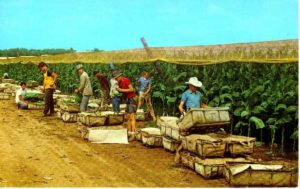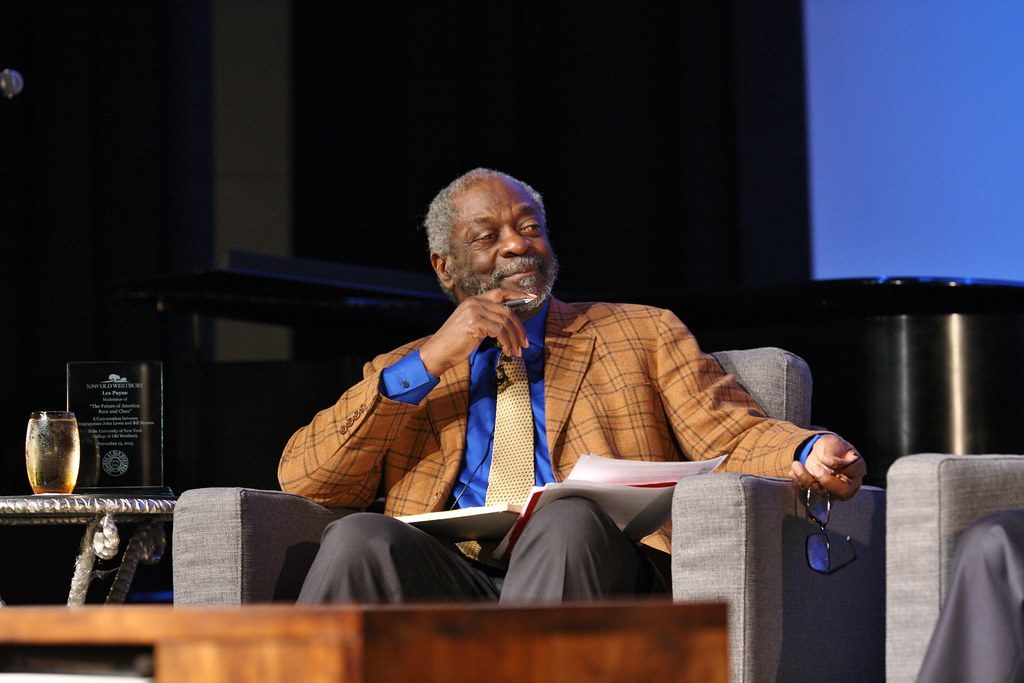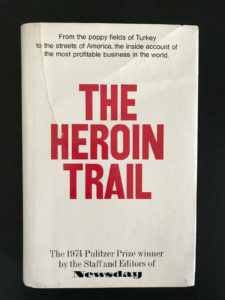By Andy Piascik
Les Payne was born in Tuscaloosa, Alabama, on June 12, 1941, but he grew up in Hartford and attended the University of Connecticut. He became one of the best-known African American journalists in the United States beginning in the 1970s and won several awards over his long career. He did most of his work for Newsday, the Long Island-based daily newspaper that for ten years also published a New York City edition known as New York Newsday.
Growing Up in Hartford

Postcard Picking Tobacco in the Connecticut River Valley, ca. 1950-1965 – Windsor Historical Society, Windsor
Payne was thirteen when he moved with his mother and brothers to Hartford’s North End. He ran track at Hartford Public High School and graduated in 1960. His mother earned a living pressing clothes at a neighborhood dry cleaning establishment and Payne chipped in with money he earned shining shoes and delivering the Hartford Courant. He also worked for a while as a picker in the tobacco fields outside of Hartford.
In interviews he did over the course of his life, Payne spoke of the disappointment he felt at finding race relations in Connecticut only nominally better than in the South. “We had rising expectations for places like Hartford and were, in fact, disappointed, if not outright thwarted in some cases, particularly by the criminal justice system,” he said in one interview.
When Payne enrolled in the University of Connecticut as an engineering major, he was the first member of his family to attend college. He became involved in the black freedom struggle of the 1960s, which included doing support work for the Southern-based Student Non-Violent Coordinating Committee. He also mobilized UConn students to volunteer as tutors in his Hartford neighborhood.
In another interview, Payne spoke of spending many hours at the Hartford Public Library dreaming of becoming a writer. He returned to that dream and switched his major to English with the goal of becoming a journalist. He found it difficult to find work after he graduated in 1964, however, and joined the army. He was hired by Newsday a short time after he was discharged.
A Pulitzer Prize and Almost a Second
Payne covered the Black Panthers, the Attica Prison rebellion, and went undercover among mostly black workers at a migrant labor camp on a Long Island potato farm. He also worked as an overseas correspondent, including covering the growing resistance to apartheid in South Africa. He was part of a Newsday team that won the Pulitzer Prize in 1974 for The Heroin Trail–a series about international drug trafficking that traced heroin sold in New York City to the poppy fields of Turkey. According to one account, Payne was also the choice of the Pulitzer jury in 1977 for his coverage from South Africa, only to have the Advisory Board overturn the jury’s selection.
Payne was a leader in efforts to get Newsday to hire more women and people of color as reporters and to ensure that those who were hired and already employed got fair opportunities for promotion. Payne himself was eventually promoted to editor. “He has a perfect sense of equality,” said Murray Kempton, the legendary New York journalist who worked with Payne for many years at Newsday. Another colleague, Anthony Marro, said that Payne was second only to one-time editor and publisher David Laventhol in transforming Newsday from a primarily suburban newspaper into a national one.
Maintaining Ties to Connecticut
Payne returned to Connecticut many times over the course of his life. His mother continued to live in Hartford and he was a featured speaker at a banquet of the Hartford chapter of the National Association for the Advancement of Colored People in 1986. In 2003, Payne was the commencement speaker at UConn and the following year gave the convocation at Conard High School in West Hartford. He also received a special proclamation from the Connecticut General Assembly marking his outstanding career.
Payne taught for many years at the Columbia University Graduate School of Journalism. He was a founding member and president of the National Association of Black Journalists and appeared regularly on WBAI-FM in New York. Payne retired from his editor’s position at Newsday in 2006 but continued writing columns until retiring for good in 2009. He died in Harlem on March 19, 2018, at the age of 76.
Bridgeport native Andy Piascik is an award-winning author who has written for numerous publications and websites over the last four decades and is the author of several books. He can be reached at andypiascik@yahoo.com.









